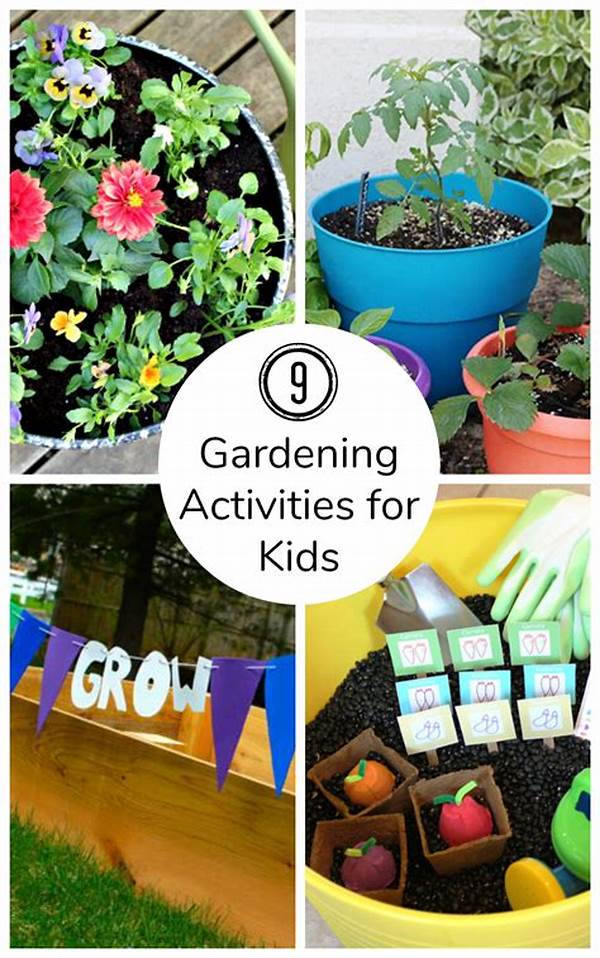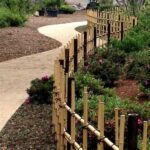Hey there, fabulous parents and garden enthusiasts! If you’re on the lookout for a fun and educational way to get those little munchkins outdoors, you’re in the right spot. Today, we’re diving into some groovy educational garden ideas for kids that’ll have them learning and loving every minute in the dirt. So, grab a lemonade, kick back, and let’s dig into some plant-tastic ideas!
Read Now : Keeping Bouquets Fresh Longer
The Magic of Mini Gardens
Alright, first up, let’s chat about the magic of mini gardens. These small-scale plots are the perfect intro to gardening for your kiddos. The idea is simple: create a small, manageable patch of garden space that your kids can call their own. With educational garden ideas for kids, you can turn this into an engaging project that fits right into their curious little minds. These mini gardens can host a variety of plants—think herbs, flowers, or even veggies. Watching their little green friends grow from seeds to sprouts to fully-fledged plants is like a nature-packed soap opera. And the learning? Just endless! Kids get to explore concepts like plant life cycles, photosynthesis, and the importance of responsibility. Plus, they’ll love the satisfaction of a harvest they grew themselves. With these educational garden ideas for kids, every day is an adventure in the making!
Fun & Funky Edible Explorations
1. Herb Haven: Set up a fragrant herb garden. Educational garden ideas for kids can start with basil and mint which they can identify by smell!
2. Veggie Patch Vibes: Carrots, radishes, and lettuce are easy-peasy crops kids love to grow—and snack on!
3. Berry Bonanza: Strawberry or raspberry bushes are a sweet addition that teaches patience as kids wait for fruit to ripen.
4. Leafy Greens Scene: Spinach and kale are superfoods! Growing them introduces kids to healthy eating basics.
5. Flower Power: Nasturtiums and pansies are edible blooms. Kids can spice up their salads and learn which flowers are safe to eat.
Nature Journals: A Kid’s Gardening Diary
Keeping a nature journal is like having a secret garden diary. With these educational garden ideas for kids, journaling transforms into a magical journey. Encourage them to jot down their garden observations, sketch budding flowers, or even write short stories inspired by their leafy pals. It’s a whimsical and crafty way to engage their creativity while reinforcing what they learn about plant species, weather patterns, and ecosystems. Through these entries, kids turn into mini botanists, noting the daily changes and surprises their gardens offer. This practice not only enhances their observational skills but also develops their writing and art talents in an organic, stress-free way. With pages filled with leaf rubbings and pressed flowers, each journal becomes a memory book, documenting their growth as young gardeners. Not to mention, it’s a fab keepsake for looking back at how much they’ve learned and nurtured!
Read Now : Long-lasting Artificial Floral Suggestions
Themed Garden Parties: Learning in Disguise
Everybody loves a theme party, right? Well, why not turn your garden into a living party with a variety of educational garden ideas for kids? A “Butterfly Bonanza” with flowers that attract these fluttering beauties or a “Pizza Party Garden” with tomatoes, basil, and oregano, can make for a rocking hands-on learning day! Kids will think they’re just having fun; meanwhile, they’re discovering pollination, the importance of biodiversity, or culinary arts. These parties are like sneaky little ways to amp up the fun factor in learning, with vibrant lessons wrapped in joy and soil! Your garden becomes both the classroom and the playground, combining the best of both worlds for a truly engaging educational experience.
Sensory Gardens: Engage All the Senses
Sensory gardens tap into all the senses, turning learning into a full-body experience. These educational garden ideas for kids seek to stimulate sight, sound, touch, smell, and even taste! Think soft lamb’s ear for touch, brightly colored marigolds for sight, aromatic lavender for scent, and wind chimes for sound. Having these elements in your garden can enhance cognitive growth, especially for younger children, who learn best through sensory exploration. Every plant, every texture, becomes part of a larger story that unspools as they wander and wonder. Through engaging their senses, children develop an intuitive understanding of the natural world, making these gardens excellent learning spaces that are holistic, inclusive, and oh-so-fun!
Creative Planting Designs: Art Meets Garden
Gardens can be a canvas, friends! With creative planting designs, educational garden ideas for kids branch out into the realm of art. Try a rainbow garden with flowers of different colors or a checkerboard garden with alternating patches of grass and herbs. Encouraging kids to sketch their designs before planting ties in art skills with biological study, demonstrating how nature and creativity are interconnected. This artistic approach to gardening fosters imagination while teaching kids about planning and executing projects. Plus, they get to see their artistic visions come to life—literally! Through these colorful expressions, gardening becomes an artistic escapade that delights both the senses and the spirit.
Wrapping It Up: Growing Future Gardeners
In wrapping up our stroll through educational garden ideas for kids, the main takeaway is to cultivate curiosity and wonder. These garden projects are more than green thumbs and muddy boots; they’re about nurturing future generations who appreciate the beauty and balance of nature. When kids dig their hands into the soil, plant a seed, and watch it grow, they learn patience, ecology, and the joy of nurturing life. It’s an education that transcends typical classroom confines, sprawling into the vibrant gardens of their imagination. These experiences plant the seeds of environmental stewardship and creativity that can bloom throughout their lives, inspiring a future where kids grow, learn, and thrive alongside their garden groves.
Please note that for a comprehensive educational experience, incorporating fun facts, hands-on activities, and real-time projects can enhance the impact of these garden ideas. Happy gardening with your little ones!


